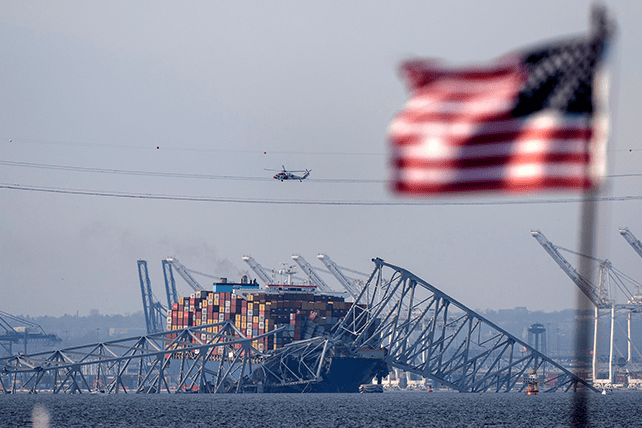(RNS) — Day in and day out, ministers to seafarers spend their times on the docks of Baltimore, delivering Bibles, magazines and a friendly face during a ship’s usually brief time in the busy port.
But, with the collapse Tuesday (March 26) of the Francis Scott Key Bridge, the mission of two ministries has shifted to longer-term aid for the crews of the Dali ship that struck the bridge and seven other large vessels stuck in the port for the foreseeable future.
The leader of one of the ministries, the Rev. Joshua Messick, said he will be advocating for the rights of those crew members, including that they have adequate provisions and that their shore leave is not restricted.
“My primary focus will be on caring for those seafarers who cannot continue their journeys,” said Messick, an Episcopal priest and executive director of Baltimore International Seafarers’ Center. “Just making sure they have everything that they are supposed to have and everything that they need to make their extended stay here as pleasant as possible.”
Andy Middleton, a lay Catholic ecumenical minister who directs the other ministry, the Archdiocese of Baltimore’s Apostleship of the Sea, has been communicating via WhatsApp with a couple of the crew members on the Dali, who remained on the ship, which is still entangled with bridge debris.
“I’ve been reaching out to them periodically since (Tuesday) morning, just to check in and make sure everybody’s still doing OK, reminding them that we’re here for them and that we’re praying for them,” he said, “and making sure that they know that when they eventually get clear of the incident and come back to a berth that we’ll still be here, waiting for them and wanting to help them.”
Their work with the crews comes as federal, state and local officials grapple with a complicated set of problems, including clearing bridge debris, getting ships back into the port and rejiggering a sprawling supply chain that ranges from cruises to coal to cars — and, eventually, rebuilding the bridge that spanned the Patapsco River.
Maryland Gov. Wes Moore spoke at a Wednesday news conference, where it was later announced that the bodies of two of the six people who had been missing were found. He acknowledged the words of kindness and the prayers from around the world.
“To everybody who is sending out those prayers I want to say that we have felt them and we’ve been comforted by them,” he said. “We’re also going to need your support. The collapse of the Key Bridge is not just a Maryland crisis. The collapse of the Key Bridge is a global crisis. The national economy and the world’s economy depends on the Port of Baltimore.”
As the officials work to help the wider population affected by the crisis, Messick and Middleton say their teams continue to focus on the particular needs of those who are at its ground zero. For example, providing familiar food to the stranded Indian crew.
“One of my first thoughts is once the crew gets back into a berth, maybe having a dinner of Indian food cooked and then delivering it to the vessel,” said Middleton, who works with six volunteers. “The cook doesn’t have to cook a meal for the entire vessel. He can take a break and everybody can sit down and eat together.”
Messick’s center, which includes a Lutheran and a Baptist chaplain and volunteers, is affiliated with the global Mission to Seafarers.

